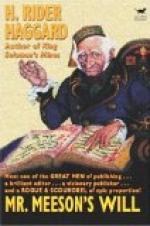And she departed and left Augusta to her reflections, which were—well, not unpleasant ones.
Meanwhile Eustace was marching towards the Temple. As it happened, in the same lodging-house where he had been living for the last few months, two brothers of the name of Short had rooms, and with these young gentlemen he had become very friendly. The two Shorts were twins, and so like one another that it was more than a month before Eustace could be sure which of them he was speaking to. When they were both at college their father died, leaving his property equally between them; and as this property on realisation was not found to amount to more than four hundred a year, the twins very rightly concluded that they had better do something to supplement their moderate income. Accordingly, by a stroke of genius they determined that one of them should become a solicitor and the other a barrister, and then tossed up as to which should take to which trade. The idea, of course, was that in this manner they would be able to afford each other mutual comfort and support. John would give James briefs, and James’ reflected glory would shine back on John. In short, they were anxious to establish a legal dong firm of the most approved pattern.
Accordingly, they passed their respective examinations, and John took rooms with another budding solicitor in the City, while James hired chambers in Pump-court. But there the matter stopped, for as John did not get any work, of course he could not give any to James. And so it came to pass that for the past three years neither of the twins had found the law as profitable as they anticipated. In vain did John sit and sigh in the City. Clients were few and far between: scarcely enough to pay his rent. And in vain did James, artistically robed, wander like the Evil One, from court to court, seeking what he might devour. Occasionally he had the pleasure of taking a note for another barrister who was called away, which means doing another man’s work for nothing. Once, too, a man with whom he had a nodding acquaintance, rushed up to him, and, thrusting a brief into his hands, asked him to hold it for him, telling him that it would be on in a short time, and that there was nothing in it—“nothing at all.” Scarcely had poor James struggled through the brief when the case was called on, and it may suffice to say that at its conclusion, the Judge gazed at him mildly, over his spectacles, and “could not help wondering that any learned counsel had been found who would consent to waste the time of the Court in such a case as the one to which he had been listening.” Clearly James’ friend would not so consent, and had passed on the responsibility, minus the fee. On another occasion, James was in the Probate Court on motion day, and a solicitor—a real live solicitor—came up to him and asked him to make a motion (marked Mr.——, 2 gns.) for leave to dispense with a co-respondent. This motion he made, and the co-respondent was dispensed with in the approved fashion; but when he turned round the solicitor had vanished, and he never saw him more or the two guineas either. However, the brief, his only one, remained, and, after that, he took to hovering about the Divorce Court, partly in the hope of once more seeing that solicitor, and partly with a vague idea of drifting into practice in the Division.




